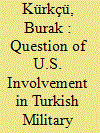|
|
|
Sort Order |
|
|
|
Items / Page
|
|
|
|
|
|
|
| Srl | Item |
| 1 |
ID:
187232


|
|
|
|
|
| Summary/Abstract |
During the 1960s, the U.S. Central Intelligence Agency’s U-2 spy planes, piloted by Chinese Nationalist airmen from Taiwan, flew routinely over the Chinese mainland monitoring the Chinese nuclear weapons program; the overflights also demonstrated Beijing’s military weakness and inability to control its airspace. In spite of having only a few Soviet-made surface-to-air missile systems, the People’s Liberation Army Air Force was convinced that human factors, especially agility in strategy, operations, and tactics, could overcome a superior enemy. Although much remains secret, sources now available shed new insights into this secret Cold War history. Moreover, as the Chinese claimed themselves, these experiences remain valuable for China’s military response to war.
|
|
|
|
|
|
|
|
|
|
|
|
|
|
|
|
| 2 |
ID:
187230


|
|
|
|
|
| Summary/Abstract |
In early 1944, the future Allied landing sites in Normandy were lightly defended by Germany. By D-Day, 6 June 1944, that had changed. Erwin Rommel’s beach obstacles and onshore “asparagus” intended to disrupt any landings are well known. But the defending forces had increased markedly: two airborne units protecting the Cotentin, a Panzer division at Caen, two others within reach, and all coastal sectors reinforced. What caused the sudden attention to Normandy? The impetus clearly came from Adolf Hitler, and a common explanation is his “intuition.” A far better one, this account argues, comes from examining the Kriegsmarine analysis of Luftwaffe photoreconnaissance efforts, which can directly explain Hitler’s actions.
|
|
|
|
|
|
|
|
|
|
|
|
|
|
|
|
| 3 |
ID:
187227


|
|
|
|
|
| Summary/Abstract |
The Military Revolution debate has dominated histories of early modern warfare for over sixty years. This essay searches for new analytical avenues by charting the nature, causes, and implications of variations in Mughal warfare in early modern South Asia. It argues that a range of factors—including environmental conditions, military pragmatism, financial considerations, and distance from the imperial heartland—caused Mughal war-making to become heterogeneous over time and across space and produced variations in strategy, tactics, and deployment of technologies. These variations affected the broader processes of Mughal war-making and empire-building. This line of investigation bears potential to influence the writing of comparative military histories and the study of early modern warfare while looking beyond the Military Revolution framework.
|
|
|
|
|
|
|
|
|
|
|
|
|
|
|
|
| 4 |
ID:
187228


|
|
|
|
|
| Summary/Abstract |
Military violence against noncombatants in the French conquest of Algeria (1830–1847) resulted as much from the actions of ordinary soldiers as from commanders and politicians. This article examines the justifications that officers used to explain their attacks on noncombatants in North Africa. Instead of using the well-known twentieth-century excuse for atrocity, that the participant was following orders from above, nineteenth-century officers tended to justify controversial acts as necessary to the preservation of the lives of their soldiers and indigenous allies. Reports from lieutenants and captains on French expeditions at Miliana (1840) and Dahra (1845) suggest that low-ranking soldiers had more agency in escalating violence against noncombatants than did their leaders. Eyewitness accounts reveal that soldiers’ emotions such as fear, anger, and greed drove violence against North African noncombatants.
|
|
|
|
|
|
|
|
|
|
|
|
|
|
|
|
| 5 |
ID:
187231


|
|
|
|
|
| Summary/Abstract |
This article is an investigation of declassified archival documents of the Central Intelligence Agency (CIA) that questions the direct involvement of several U.S. administrations in military coups in Turkey during the Cold War. Among the U.S. government institutions, it is argued that only the CIA could have had the competency for covert participation in a coup plot abroad. Other than the indirect role of the U.S. in military takeovers, due to its military and financial assistance in pre-coup periods, and the political recognition of coup regimes, available CIA documents do not present any tangible evidence for agency’s direct involvement in Turkish military coups, in contrast to its clandestine operations in other states.
|
|
|
|
|
|
|
|
|
|
|
|
|
|
|
|
| 6 |
ID:
187229


|
|
|
|
|
| Summary/Abstract |
During the first decades of the twentieth century the American public developed a fascination with the concept of the future war. Indeed, by the interwar years future war tales had become a staple of American popular culture, primarily via the mass circulation pulp magazines, where they played a pivotal role in promoting the growth of the science fiction genre. This study considers the role of the future war story in engaging the American public’s interest in military affairs during the first decades of the twentieth century, with a specific focus on the role of the author/editor/publisher Hugo Gernsback (1884–1967).
|
|
|
|
|
|
|
|
|
|
|
|
|
|
|
|
|
|
|
|
|